
Peace on earth, goodwill towards all
![]() Dr Mhoira Leng
Dr Mhoira Leng
![]() 22nd December 2017
22nd December 2017
One of the names given to the tiny baby born in a stable in Bethlehem over 2000 years ago is Prince of Peace. This message was emblazoned accross the skies as angelic beings sang the good new of hope and peace for the world to a terrified but excited group of shepherds...one of the most socially invisible groups in society. Who would believe a shepherd was chosen by God for a worldwide message of peace...and who would be similarly excluded in our societies!
In palliative care we have the honour and responsibility to support values based health care that respects the dignity of each person and family and seeks to relieve suffering and support quality of life. I think of palliative care as bringing this message of hope and peace to people and families who are struggling, fearful, hopeless and in pain...and to seek to ensure this care is available regardless of the poverty, geography, lifestyle, setting or illness...truly palliative care for all as part of health care for all.
Earlier this year I was sitting in Bethlehem a short distance from Manger Square, Star Street and the beautiful Church of the Nativity where so many pigrims and tourists flock. Instead I was gazing at the dividing wall cuting accross this land like a terrible scar and representing such fear, anger, injustice, hopelessness and lost opportunities. I was reflecting on the lack of peace in the Midde East and the sadness for those divided and hurting in so many ways. This wall continues to grow and yet some adorn it with grim humour and statements for unity and peace. I meet so many people working to survive, to make a difference, to seek justice and peace.
I was privileged to be in Gaza twice this year. Firstly with Medical Aid for Palestine on a scoping visit for breast cancer support along with several Scottish colleagues inlcuding Dr Phillipa Whitford UKMP. (see https://www.map.org.uk/news/archive/post/747-mapas-breast-cancer-care-in-gaza-aliaas-story) We hope this will become a formal multidsciplinary prgramme incorporating palliative care. I was also able to work with amazing colleagues from IUG (Dr Fadel Naim and Dr Khamis Elessi) and the UK (Dr Janet Gillett and Dr Kathey Myers) to deliver the second undergraduate training in palliative care and celebrated the work of Cairdeas through #cairdeaspurpleparty on World Hospice and Palliative Care Day. I was also able to joinng the steering group discussions led by IUG, MOH, WHO, UNRWA, PMRS and others and discuss ways to support in the future. Next up is a new Diploma in palliative care which is almost finished the development stage and we look forward to supporting in partnership.
However the situation in Gaza is a humanitarian disaster deteriorating each day. Electricity may be available only a few hours a day and this affects basic services such as sewage management and of course affects hospitals. Essential medications are often low or stocked out..60% of cancer medications and NO ORAL MORPHINE at all. Travel permission may be given for travel outside Gaza for essential treatments such as radiotherapy in East Jerusalem or the West Bank but in pratice more than half who would benefit are denied. In Gaza people are simply trying to survive and praying for peace or at least for basic freedoms to travel and receive health care. In Bethlehem, the city is beng dwarffed by the settlements (illegal in international law) and choked by the snaking wall.
Let me tell you a couple of stories. Abdul (name changed) was talking with the medical students about his experience of living with advanced sarcoma and clearly in significant pain when suddenly the door burst open and he was given his permission papers for travel to East Jeruslem and Ramallah. In the happy, frustrated, noisy chaos he desparately asked...'do I need pain control and radiotherapy or surgery more?' As he got ready television cameras arrived and in between filimng (which included me) we gave him some advice re pain medication and tried to ensure he would see someone who could help. In fact his cancer is now very advanced but at least he will get good palliative care interventions. His words 'I feel I have been given back some dignity'
Another young woman has delayed coming with her breast cancer as she was so scared of having a mastectomy. She has not long delivered her youngest child but knew the risks as several members of her family have died of breast cancer including her mother (in her forties). After some counselling and support for her and her husband from the Gaza and MAP teams she agreed for further treatment for her now advancing disease and we are hoping and praying she will be allowed to travel for radiotherapy after her surgery. The surgeon learnt from the encounter as his initial reaction had been 'This is one young woman who does not want surgery and I dont feel comfortable discussing it' yet he was able to see good communication and take part in the discussion and treatment decisions.
An older lady has just found our her breast cancer diagnosis and was looking sad, sitting quietly with her sister. The clinics are busy with no nurse specialists and most trainied to offer physical support and not psychosoial or spiritual. We spoke together, supported by translation, and she talked of her sadness at never having children, her husband who has already died, her frail mother with diabetes needing amputaton and now this cancer diagnosis. 'I feel so sad but I am trusting in God, Hamdulilah'
There is a new report on palliative care, the Lancer Commission (see Resources section), that shows once again the overwhelming need for palliative care and coins a new term, serious health related suffering. New ways looking at this age old issue of suffering and pain are needed but most of all we need to mobilise individuals, communities, civil society, faith communities, social entrepreneurs and governments to address this huge need. In Cairdeas we are privileged to work to build capacity, raise awareness and develop training to do our part in ensuring that one of the most excluded groups in our society has the care they need and deserve in 2018 and beyond. This includes refugee and migrants groups such as those affected by chronic conflict in Gaza and the huge refugee camps for South Sudanese in Northern Uganda. We are glad to be part of a network seeking to find solutions PALCHASE.
My thanks to all we have partnered with in 2017 and to the privilege of visiting and working in Uganda, Rwanda, India, Nepal, Gaza, West Bank and to our friends in Mauritania with Cairdeas Sahara. Thanks to the amazing team in Makerere and Mulago Palliative Care Unit and Palliative care Education and Research Consortium where I am based much of the year. Thanks to IAHPC for their amazing work and the honour of being a board member. Many thanks to all our supporters and those who volunteer their time and expertise. Please remember our Christmas Appeal which will allow our partners to become sustainable, to care for refugees and to be trained. Follow us on Twitter @CairdeasIPCT and on FB or sign up to get more involved.
Visiting the places so familiar in the Christmas story was a privilege ...and also to visit and think beyond the nativity scene to the life and example of Jesus as he lived and died and brings to fulfillment this message of hope and peace to all men. May all wall’s come down...the ones within ourselves componded by grief and loss and pain...dividing walls functional and physical all over the world between races, religion, societies, resources and nationalities...may Jerusalem be a city of faith and peace radiating to the end of the earth....may 2018 allow us all the privilege to know how to be peacemakers.

Follow the star
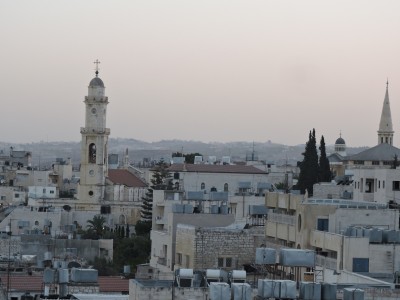
O little town of Bethlehem
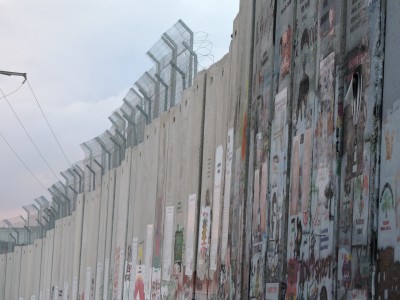
Dividing walls
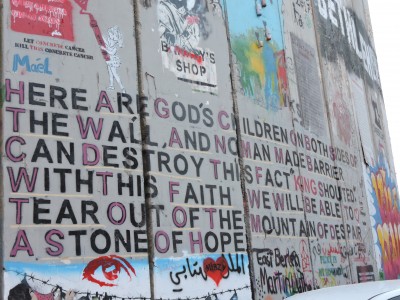
Graffiti quoting MLK 'tear out of this mountain of despair a stone of hope'
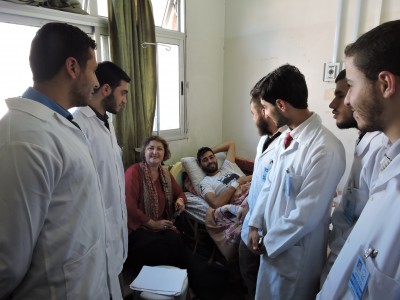
'Abdul' finds he has permission to travel
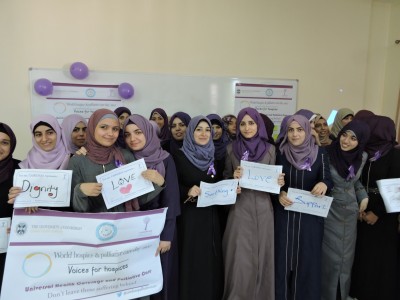
World Palliative Care Day in Cairdeas purple
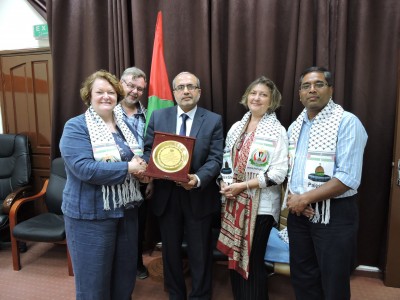
MAP faculty with Dr Abdul Latif, MOH
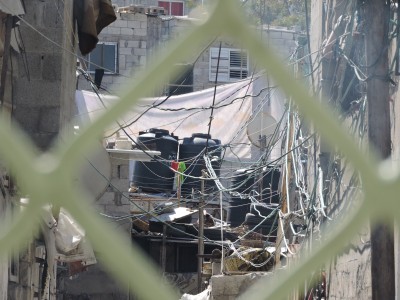
Seeking electricity
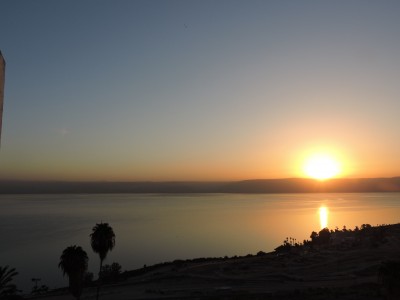
Galilee sunrise
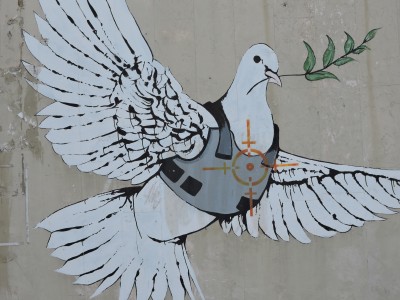
Banksy's armoured dove of peace
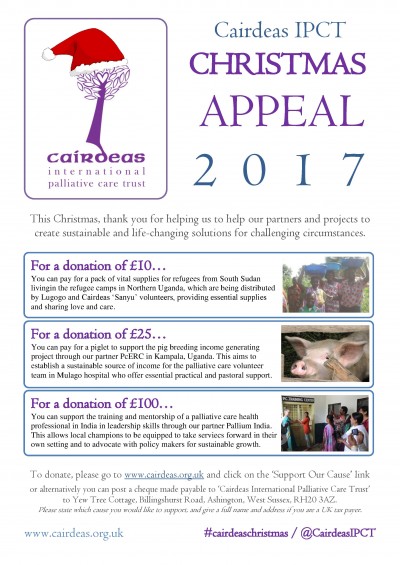
Support the work of Cairdeas
A jam-packed palliative care weekend in Edinburgh!
![]() Cairdeas
Cairdeas
![]() 6th November 2017
6th November 2017
September saw the amalgamation of various Cairdeas events in south-east Scotland to create a jam-packed weekend of exciting activities, discussions and updates: Cairdeas Ops Director Dan Knights shares some highlights...
The weekend kicked off on Saturday 16th September with a special meeting of our trustee board. Due to the team being spread across the UK, it was a welcome opportunity to connect face to face, but also a chance to turn our minds to the broader strategy of Cairdeas. Building on the excellent work that was put into our previous strategic plan, we are now in the process of updating this and laying out our vision for the few years to come – watch this space for more updates!
That very afternoon, we gathered some of our faithful supporters at our annual Gathering in Kirkintilloch Baptist Church. It was a real pleasure to link up with old friends and new friends, and to hear from Mhoira and recently returned volunteer Alice about the ongoing exciting work in Uganda and elsewhere, and also a chance to kick off this year’s purple party season with a fantastic array of purple edible goodies, with purple outfits to match!
Two days later saw the inaugural meeting of the Cairdeas Faculty – an initiative where we are looking to formalise and develop the way we work with those numerous experts in global palliative care who have provided mentorship, training and other support through Cairdeas in the past, or are interested to do so in the future. The experience in the room was immense and we had some very rich discussions about the challenges, priorities and opportunities for this group going forward. We are hoping to offer opportunities to use people’s talents both through short term international trips, but also through the development of resources from the UK which will support our work internationally. Again, watch this space for more details and do get in touch with me on operations@cairdeas.org.uk if you would be interested in getting involved with this group.
These meetings were all planned to also coincide with the Edinburgh Global Palliative Care Day, which is coordinated jointly between Cairdeas, the University of Edinburgh, and other partners, and has become an annual diary fixture and great chance to build relationships and network with others sharing a passion for developing palliative care globally. This year the focus was on universal health coverage and leadership, with stimulating talks ranging from Dr Jane Bates’ insights into her PhD work looking at palliative care as a means to alleviating poverty, to our own Mhoira Leng sharing on the relevance of palliative care in humanitarian crises, to a new way of sparking discussion on actions and ways forward in the form of an ideas café! Our friend and colleague Julia Downing has reported on this event in an eHospice blog, so do check it out for more details!
From a personal perspective, this first run of Cairdeas’ key meetings with me in the Ops Director role was a great chance to meet with colleagues face to face. Primarily working from home and only communicating with people via the internet can be pretty isolating, so the buzz of bringing so much enthusiasm together into one place was palpable for me! It’s particularly exciting to see Cairdeas taking an active role in contributing to the coordination of bigger events such as the Edinburgh Global Day, and to see our much-discussed plans for the Cairdeas Faculty beginning to come to fruition!
It was also great to see people decked out in their purple party-wear and raising awareness of what Cairdeas means to them - and various of you have followed in their footsteps with your own #cairdeaspurpleparty! If you didn't get a chance to run one this year, keep your eyes peeled for next year's campaign!
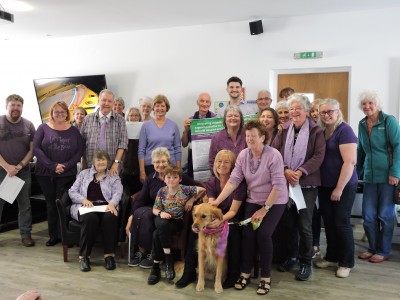
Cairdeas Gathering 2017
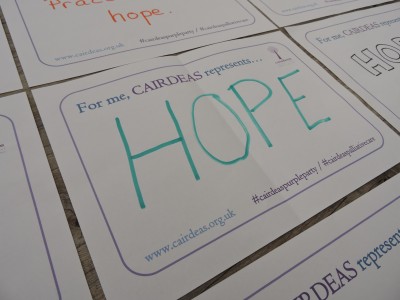
What does Cairdeas represent for me?
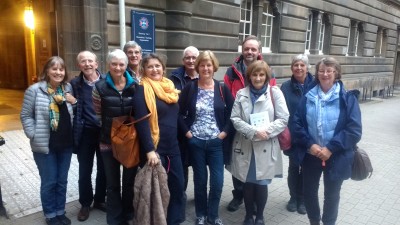
Cairdeas Faculty is born
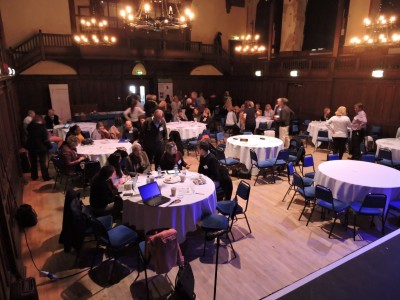
Momentum gathering for global palliative care at our annual meeting
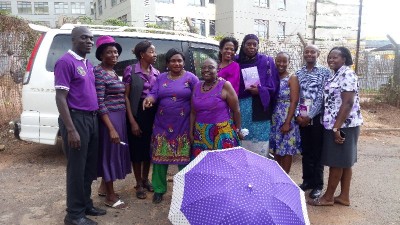
MPCU team in glorious purple
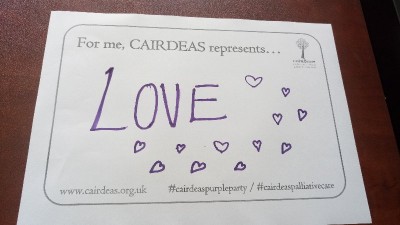
What does Cairdeas mean to you....love
UCI-PCAU JOINT CONFERENCE 2017
![]() Cairdeas
Cairdeas
![]() 29th September 2017
29th September 2017
Many of our Uganda MPCU colleagues were able to particiate in this groundbreaking conference with some supported by Cairdeas scholarships and an opportunity to share an information stall with our partners the Global Health Academy, Edinburgh and the International Children's Palliative Care Network. Mwazi Bautli is one of our longeststanding members of MPCU and has recently completed the nurse leadership fellowship. She was involved in the planning of the conference as well as participating and shares her experiencce in this blog.
This was a joint international conference of cancer and palliative care. This was an exciting undertaking in which a government institution was working with a non-government institution. It was the 7th biennial Palliative Care Association of Uganda (PCAU) conference and Uganda Cancer Institute (UCI) celebrating 50 years of cancer care since its establishment. It was planned for 600 delegates but 500 delegates attended.This was a timely reflection on cancer in Uganda and palliative care together as the burden of cancer is increasing, this is so because most of our patients report late for treatment or are diagnosed in the late stages of their illness making palliative treatment and care the only option in their management in our resource limited setting. The theme of the conference was “United against cancer: Prevention to end of life care”. This was a two day meeting held on 24th and 25th August at Resort beach Munyonyo. It was preceded by a preconference symposium on breast cancer care. The first day ended with a grand Gala dinner for UCI @50 where several recognition awards were given to individuals who have contributed to both cancer care and palliative care including our very own Prof Julia.
I was privileged to be a member of the organising committee and more specifically on the scientific committee which comprised of 20 members drawn from UCI and other organisations providing care to patients with life limiting illnesses including MPCU. I was the secretary to this committee and i was responsible for taking record of the proceedings of all the deliberations of the meetings. This was very enriching as it gave me the opportunity to utilise different skills to be able to keep track of all the information. The same committee was not only tasked with reviewing the abstracts but also developing the conference program. This undertaking focused on evidence based practice as well as new innovations in cancer treatment and palliative care. A total of 118 abstracts were received and out of these 50 were accepted for oral presentation and out of these 29 were in cooperated into the conference program. While developing the program, names of prominent health care personalities kept coming up and I was eagerly waiting for the conference to happen so that I could interface with some of them. At the same conference, I was among the presenters on the track of Service provision. During this time I not only represented MPCU in general but also the nurse leadership fellows as the work I presented on the prospective study conducted to evaluate nurse opioid prescribers in Uganda.
While developing the conference program, this was not only exciting but it was also challenging as some members were involved in this assignment for the very first time. A criteria was developed to aide in the selection of the abstracts for both poster and oral presentations. During the conference I was able to interact with high profile persons both locally and internationally. During the 2nd day of the conference I celebrated my 54th birthday in a special way with more than 400 delegates singing for me. This was very exciting and I look forward to many more collaborative conferences.
This particular conference was very beneficial to me as an individual as it emphasised the importance of collaboration and networking. Further everyone has the capacity to significantly contribute to organisation of any activity regardless of their position and role in the healthcare system. This has further improved my confidence and communication skills both written and oral. This has also helped me make new friends. I have come to realise that when we come together much can be achieved through sharing of our expertise.'
All the conference presentations and posters will be available on our resources section.
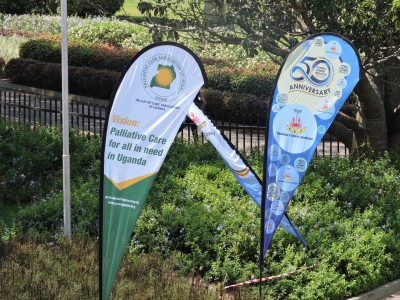
PCAU and UCI joint logos
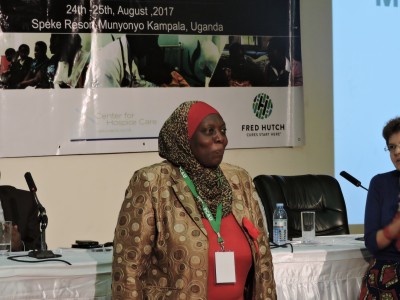
Mwazi Batuli.happy birthday
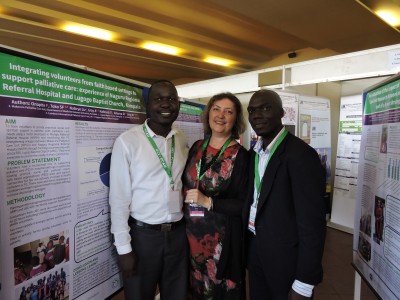
Ivan, Toko and Mhoira with Sanyu team volunteering poster
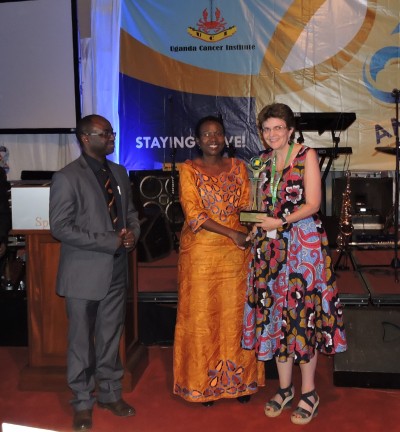
Julia being presented with her award
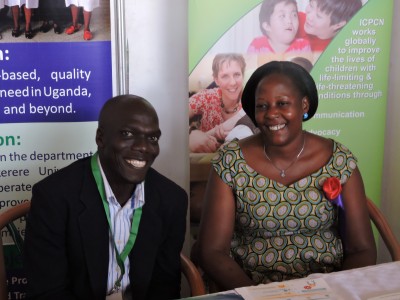
Jennie and Toko managing the stall
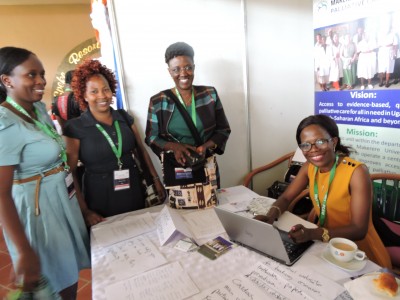
Grace helping students join IAHPC
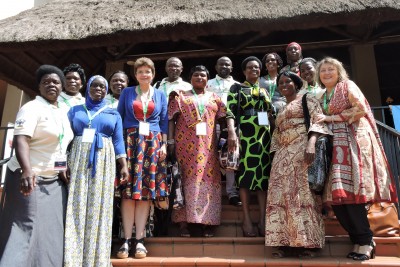
Nurse leaders
